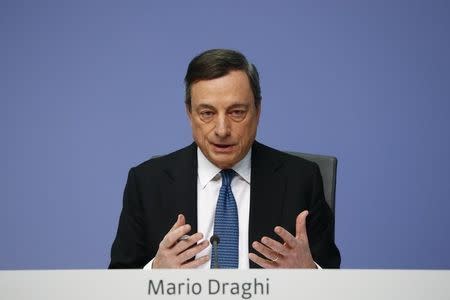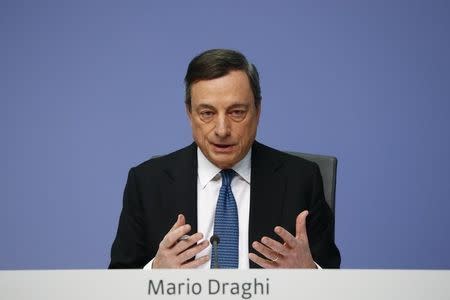ECB defends 'Super Mario' after investor backlash
By John O'Donnell and Francesco Canepa
FRANKFURT (Reuters) - The European Central Bank embarked on a rearguard action to win over sceptical investors on Friday, a day after chief Mario Draghi unveiled a new stimulus package but blunted its impact by suggesting the ECB would not cut interest rates again.
A number of top ECB officials, both publicly and behind the scenes, spoke out in support of the measures Draghi announced on Thursday although some recognised the ECB had muddled its message to financial markets.
Shortly after announcing the package, which included cuts to all three of the ECB's key rates and even a scheme through which it could pay banks to lend, Draghi stunned investors by appearing to rule out further rate reductions.
His remarks pushed up bond yields and sent the euro rising against the dollar, as investors took it to mean that the man they dubbed "Super Mario" after his 2012 pledge to do "whatever it takes to save the euro" was losing his touch.
A stronger euro and rising bond yields are the opposite of what the ECB is trying to achieve, which is to stimulate lending that will foster growth by making it cheaper for companies and households in the euro zone to borrow.
ECB officials watching from behind the scenes were aghast as markets struggling to understand the confusing array of announcements concluded that the ECB had run out of ammunition.
On Friday, ECB vice-president Vitor Constancio took the highly unusual step of publishing his opinion on the bank's website. He emphasised that while there was a limit to how low interest rates could go, central banks' ability to act in other ways should not be written off.
"Naturally, all policies have limits. In the case of the instruments we are now using, this is particularly true of negative interest rates on our deposit facility," Constancio wrote, referring to the charge on banks for hoarding cash at the ECB.
Driving home Draghi's message from a day earlier, Constancio added: "Not only is it wrong to start talking down monetary policy -- it's actually dangerous."
Backing up this line, one source with knowledge of ECB thinking emphasised the possibilities for further easing and said work was in progress to help investors better understand the steps that had been taken after Thursday's "botched" communication.
SUPPORT, SCEPTICISM
Unusually, Draghi even won some support from Ilmars Rimsevics, the head of Latvia's central bank and among the most outspoken easy money sceptics on the ECB's governing council.
Rimsevics threw his weight behind what he called a positive package of measures. "Money has become cheaper," he told Latvian television. "That is an unprecedented situation when the European Central Bank ... lends money to commercial banks at a zero interest rate."
Despite the difficulties of fostering agreement between 19 national central bank chiefs, Draghi has a track record of delivering ambitious schemes such as the ECB's 1.74 trillion euro (£1.35 trillion) money-printing programme -- albeit often with delays.
But the market reaction on Thursday, which saw investors take off bets on further rate cuts this year, represented a vote of no confidence even if it was partially reversed on Friday, when bond yields and the euro fell and stocks rebounded.
And a hard-core of scepticism remains.
"The reaction ... shows that these guys are now beginning to lose their power on the market," said Stewart Richardson, a director at hedge fund RMG Wealth management.
"That's a really worrying development because if they lose control of the market, the game is up. We are at the end of the road in terms of central banking."
There are also growing doubts, even inside the ECB, about the bank's ability to lift price inflation, a bellwether of economic health, back to its target of almost 2 percent from around zero now.
"The ECB must ask itself if 2 percent inflation is realistic," Luc Coene, a former ECB policymaker who now works as its bank supervision arm, told a newspaper.
For Latvia's Rimsevics, the package may be the last dose the ECB can give to heal the euro zone economy.
"Let's hope that it will at least stabilize the situation," he said. "Unfortunately, there is no more sweet medicine left."
(Additional reporting by Frank Siebelt, Balazs Koranyi and Gederts Gelzis; Editing by Catherine Evans)




